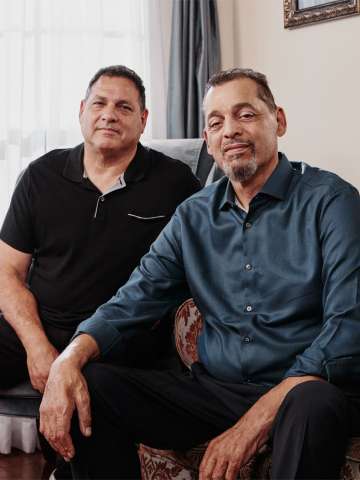Immunosuppression-Free Kidney Transplant (Tolerance Program)

What is the kidney transplant tolerance program?
Our kidney transplant tolerance program offers a groundbreaking approach to kidney transplantation. We use donor stem cells and radiation therapy to help your immune system accept a transplanted kidney. This approach, called immune tolerance or immunosuppression-free protocol, allows your body to accept the donor organ as its own.
We deliver a stem cell infusion immediately following a kidney transplant (simultaneous immune tolerance) or months to years after a transplant (retroactive immune tolerance). Retroactive immune tolerance is a promising new approach available only at UCLA Health.
How do immunosuppressive drugs affect the body?
After a transplant, the body’s natural response is to see a new organ as foreign and a threat. This response causes the immune system to reject the organ. If the immune system attacks the new kidney, it can’t function properly. Rejection can happen right away or gradually.
In standard organ transplants, recipients must take several immunosuppressive (antirejection) drugs for the rest of their lives. These drugs prevent the immune system from rejecting the new organ.
However, these drugs also have many side effects and potential complications, especially with long-term use. Side effects can include an increased risk of cancer, infections, diabetes and heart disease. Over time, these drugs may also damage the newly transplanted kidney, leading to the need for another kidney transplant.
The UCLA Health transplant tolerance protocol may help eliminate the long-term need for antirejection drugs and treatment. Our tolerance program frees kidney recipients from the lifelong burden of these medications and their side effects. More importantly, it is highly likely that these recipients will need only one kidney transplant in their lifetime.
UCLA Health excellence in kidney transplant tolerance
The UCLA Health kidney transplantation team works with experts from many departments to offer this revolutionary treatment. We bring together specialists who are leaders in their respective fields. Made possible by funding from the OneLegacy Foundation, this program reflects an unwavering commitment to our patients’ well-being.
Highlights of our program include:
Groundbreaking innovations: Our team performed the first-ever retroactive (delayed) immune tolerance procedure. We successfully delivered the donor’s stem cells 14 months after the kidney transplant, and the stem cells engrafted into the recipient’s bone marrow. This means that the recipient’s body accepted the kidney as self.
We are the only medical center in the world to offer this life-changing approach for kidney recipients. Now, anyone who received a kidney from a well-matched sibling in the past may be able to receive stem cell infusions and stop taking immunosuppressive drugs.
Continued research: Transplantation is no different from other lifelong illnesses that require newer, safer and more effective treatment options. UCLA Health prioritizes the need for more innovation for transplant patients. We are advancing the protocol to protect transplant patients from the serious complications of lifelong dependence on potent immunosuppressive medications.
We are always discovering ways to improve treatments. We offer our current program to eligible donor and recipient siblings. Our goal is to expand the program to include deceased donors and donors from outside the recipient’s family.
Multispecialty team: This immunosuppression-free approach requires extensive coordination and teamwork among specialists from many departments, including nephrology, urology, radiation oncology and hematology. At UCLA Health, we’re uniquely qualified to bring these experts together. We draw upon our combined expertise to deliver advanced treatments.
National leaders in transplants:
Since the United Network for Organ Sharing (UNOS) was established in 1988, UCLA Health has performed more solid-organ transplants than any other center in the U.S. Our team has consistently achieved excellent outcomes with highly complex cases. Plus, we often care for patients who have been turned away by other centers. Together these factors contribute to the success we’ve achieved with our transplant tolerance protocol.
How does the kidney transplant tolerance process work?
During the process, you receive a kidney and stem cells from the same donor. After kidney transplantation, our team delivers:
Targeted radiation therapy
Following transplant surgery, our radiation oncologists deliver several radiation treatments. We use a type of radiation called total lymphoid irradiation. These treatments allow donor blood stem cells to establish themselves and grow in your body along with your own stem cells, a process known as chimerism.
Stem cell infusions
After a kidney transplant and radiation therapy, hematology experts infuse stem cells from your donor. We use a specific type of cell called hematopoietic stem cells. These cells can multiply and divide, renew themselves and develop into many different types of cells in the body.
Over time, our team monitors your health and kidney function with regular blood tests. One of these tests measures the level of chimerism, or how well your donor’s stem cells blend into your own blood and bone marrow.
Benefits of the kidney transplant tolerance program
The goal after any kidney transplant is to help the immune system accept the new organ as part of the body and allow it to function as it should. This acceptance is called transplant tolerance.
Our transplant tolerance team measures chimerism at different time periods. If chimerism is consistently present (durable), the transplant recipient will most likely be weaned off immunosuppressive drugs.
Promising outcomes from retroactive kidney transplant tolerance
As the first medical center in the world to offer retroactive kidney transplant tolerance, UCLA Health is revolutionizing organ transplantation and post-transplant care. The ability to receive stem cell infusions months — or even years — following a transplant creates new and exciting possibilities for people who have already received a donor kidney from a well-matched sibling. This promising breakthrough offers immune tolerance to a broader pool of patients, so they can lead healthier lives without needing immunosuppressive drugs.
Our team continues to pioneer new treatments to improve this technique. Together, we are revolutionizing the field of transplant medicine.
Meet our team
Our transplant tolerance team includes some of the top transplant surgeons, nephrologists, urologists and hematologists in the United States. We work together to offer groundbreaking kidney transplantation, radiation therapy and stem cell infusions. You can rest assured knowing you’re getting exceptional care before, during and after a kidney transplant.
Contact us
Our experts are here to answer your questions about our immunosuppression-free kidney transplant protocol for well-matched siblings. Call 310-267-7727 or email [email protected] to connect with a specialist from our kidney transplant tolerance program to learn more.
Find your care
We have one of the country’s highest volume kidney transplant programs, with outstanding patient outcomes. To learn more about our
program, contact us at 310-267-7727 or email
[email protected].
